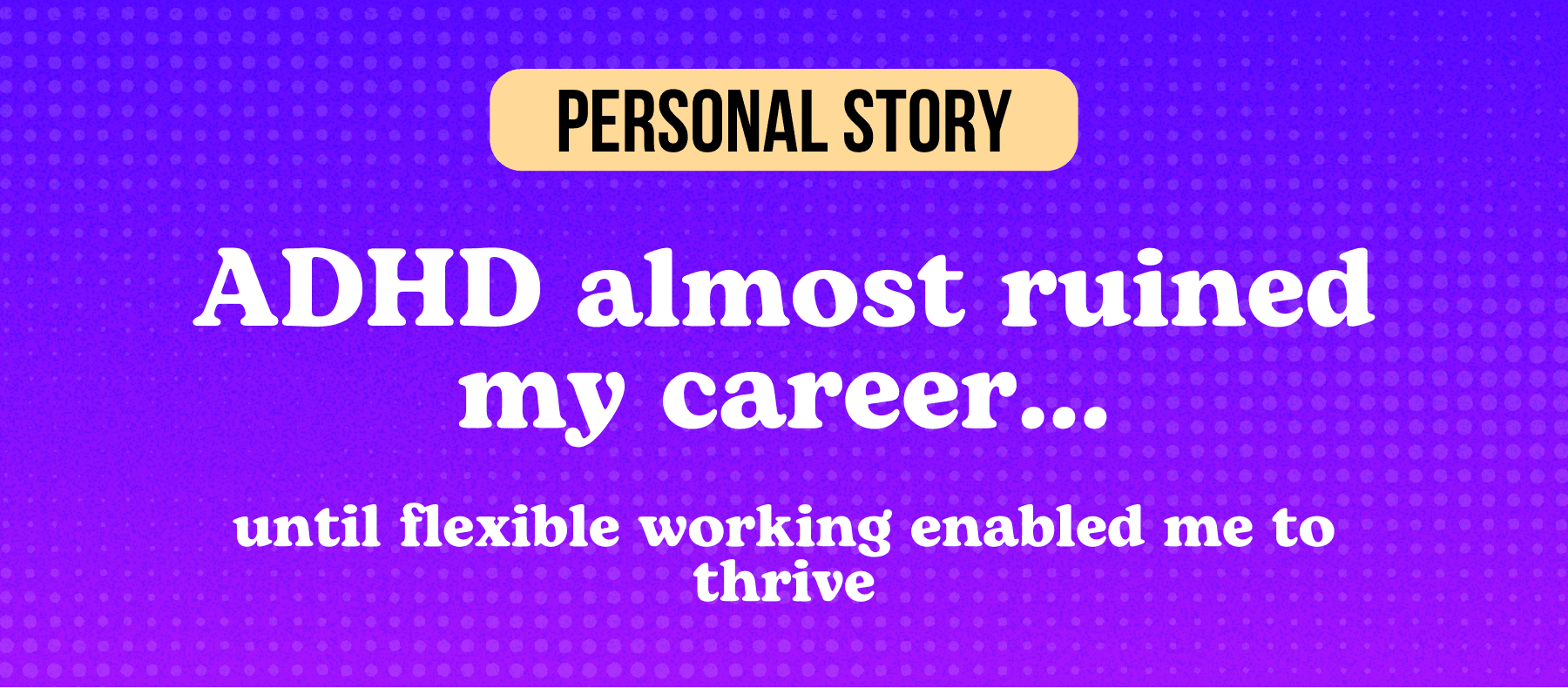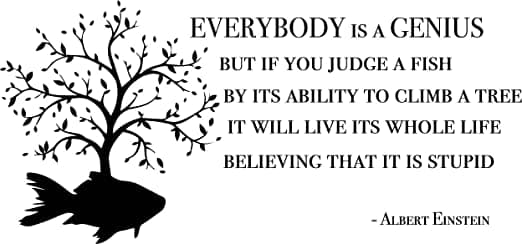ADHD almost ruined my career... until flexible working enabled me to thrive
A personal story from Flexa's Social Lead, Shannen Pollard
29th Apr 2024

My name is Shannen and I’m Flexa’s Social Lead. I was Flexa’s first full-time employee and I’ve been with the company for over 3 years now. There’s something not a lot of people know about me, and it’s something I didn’t even know myself until the Spring of 2021: I have Combined-Type ADHD.
My ADHD journey
My ADHD journey officially began when I was just 2 years old. As a toddler, I was on the go at 100 miles per hour, almost 24/7. I rarely slept, I didn’t listen, I often misbehaved, and I suffered greatly from Emotional Dysregulation. I sometimes struggled to make friends with children my own age and usually preferred the company of adults.
Growing up, the world often felt completely overwhelming to me, a feeling that only worsened as I got older. I wanted to see and do absolutely everything but at the same time, I could also be distant and isolated. I daydreamed a lot, and on days the world felt all too much, I enjoyed spending time alone in the safety and comfort of my own imagination, usually drawing, painting, or writing stories.
My Mum took me to our family GP to express her concerns on multiple occasions, and was always met with the same response, “girls can’t have ADHD, it’s a male condition and she’ll calm down when she goes to [insert curricular activity here]”.
Primary school was mostly a breeze, I was liked by my teachers and praised for my kind, comedic personality, my creativity and love of learning. I was also, however, described as chatty, easily distracted, and unfocused. I was regularly marked down for ‘silly mistakes’ in my work and my inability to complete homework to the same standard of children my age, if at all - not because I couldn’t, but because I didn’t want to. Homework was literally the worst thing in the world to me.
Secondary school was far worse. Once I hit puberty it became much harder for me to regulate my emotions and looking back, it's clear that my ADHD symptoms became much worse - which is a normal experience for women with ADHD. I was chronically fatigued, completely unmotivated, my anxiety worsened and I began to experience depression for the first time. I messed around in class, failed to complete homework and coursework, and if I did complete it, it was rushed and nowhere near the standard it could have been if I had been able to work on it properly. I had a small group of friends but still struggled to maintain relationships and always felt like an outsider. This continued past my secondary education and after just 3 months of being there, I dropped out of college, despite having the opportunity to only study subjects I was interested in.
Adult life wasn’t any better, and I spent my late teens and early twenties hopping from job to job, and hating every second of it. I felt understimulated and bored, yet found it immensely difficult to manage my workload. I was always late to work, struggled to keep deadlines, often forgot important tasks and felt completely overwhelmed. No matter what I did to try and improve my situation, I was constantly hitting walls and having doors closed on me. I felt completely trapped both in life and in my own head. I thought I was stupid and couldn't understand why I was so incapable compared to everyone else. What was wrong with me?

In 2019, I hit an all time low: my depression and anxiety were the worst they’d ever been, and were ruling my life. After years of torment, I had hit rock bottom and decided to look into therapy. I used a fantastic website called welldoing.org to search and connect with a therapist. The service matches you to a professional based on factors such as your location, particular needs, and income. I found the most wonderful therapist who I would visit once a week for an hour. I looked forward to our appointment every week and after a few months, I felt that I was beginning to make some progress. We had spoken about the fact that I felt there was something different about me, and after numerous sessions, she shared that she thought I might be displaying some symptoms of ADHD. With my agreement, she referred me for an assessment.
Private assessments were proving to be extremely expensive and once COVID hit, a lot of these services were put on hold or severely delayed. The NHS waiting list would have had me waiting 4 years for an assessment. Then, through a Facebook group I had joined, I read about a service provided by Psychiatry-UK, called Right to Choose.
Basically, with a referral from my GP, I could receive an assessment and support with finding the right medication, all covered by the NHS. And at the time, the waitlist was under a year.
My referral was successful and following quite a bit of paperwork, I was booked in for a formal assessment with an ADHD specialist. Finally, in April of 2021, at 28 years old, I was given my diagnosis. I was instantly relieved, but that feeling was soon overshadowed by a lot of other feelings and emotions; hurt, anger, depression, anxiety, and fear to name but a few.
It was a lot to process and I was constantly bombarded with intrusive thoughts, mostly around what this meant for me moving forward and how my diagnosis would impact my life - namely my career. On top of that, I had more hurdles to tackle, one of those being what is commonly known as “titration".
ADHD medication is highly regulated across the world, with some medication even being illegal in a few countries. Before I could even begin taking medication, I had to provide my medical history and all throughout I was required to supply regular blood pressure and pulse readings, as well as a note of any side effects. I was assigned a Titration Lead, who supported me throughout the entire process.
ADHD medication can be really taxing on your mind and body, especially when taking it for the first time, and there are a number of side effects it can have, varying in severity and from person to person.
Whilst I’m so grateful to have gotten the support I need, titration was a gruelling experience. I had heart palpitations, nausea, headaches, my anxiety was through the roof, my emotions were all over the place, my brain was foggy, and I was constantly physically and mentally exhausted. I had to take multiple breaks from work and my regular daily routine required some adjustment.
It was that experience that got me thinking: how on earth would I have managed if I had had to be in an office 5 days a week?
The answer: I’m not sure I could have!
It’s common for neurodivergent folk to be penalised for needing additional support and accommodations at work; even something as simple as wanting to wear headphones in the office, or needing to work from home a couple of days a week (and I’m speaking from experience). I can’t imagine being stuck at a desk and having to deal with my symptoms and the side effects I was experiencing; the ones I’ve mentioned are just the tip of the iceberg!
Flexible working changed my life
Being able to work from home and manage my own schedule was a godsend, and still is to this day.
Working from home has meant I can manage my symptoms comfortably, without any fear or embarrassment. Emotional outbursts are conducted in the safety of my own home. Fatigue and exhaustion is eased by a cosy power nap or a tasty (decaf) coffee break. My anxiety is managed by cuddling my lovely little dog, playing with fidget toys or stimming (one of my stims happens to be singing along to loud music, so probably best this is done at home). If I’m feeling unwell, I simply go for a lie down or perhaps go outside for some fresh air, and being at home means I can do this for as long and however frequently as I need. I tend to get up later, but also prefer to work later, and because I suffer from DSPD (a common condition amongst those with ADHD), working during the early hours is not unusual for me.
The wonderful thing about flexible working is that I have choice, and the freedom to be myself. At home, there’s no need for me to hide my ADHD symptoms and exhaust myself pretending to be a “normal” human.
My colleagues are incredibly supportive of my ADHD and thus, I have always felt comfortable discussing it with them. That, in turn, gives me the confidence to show a lot of who I am, quirks included, which I’ve never really felt I’ve been able to do in an office.
Offices can be incredibly over-stimulating for me, making it near impossible to focus on my work. I am sensitive to certain sounds and lighting, I'm not great with eye contact, and in-person social interactions can cause me a lot of distress, not to mention a lot of recovery afterwards. I've always struggled to build relationships with my colleagues which, in the past, has led to me missing out on social events or even career development opportunities. It was pretty lonely, to be honest. I never quite ‘fit in’ and the majority of my lunch breaks would be spent alone and away from my colleagues. This caused me to feel isolated and anxious, and only worsened my already low self esteem. All of this, on top of feeling overwhelmed with my workload, would have me experiencing severe panic attacks every morning and calling in sick more often.
Every neurodivergent person is unique and each of us is affected differently by our conditions, but for me, working from home is the best solution. I’m comfortable at home, being here makes me happy. I’m more productive, I feel in control, I’m able to relax and it means I can manage my symptoms in the place I feel safest.
Before I finish, I’d also like to add that despite the hardships of ADHD, I am ultimately proud of who I am and how far I’ve come, despite not having any medication or professional support for the majority of my life. ADHD people are some of the most incredible individuals out there. We are strong, we are creative, we’re quick-thinking, dynamic, we’re spontaneous, we’re packed full of ideas, we’re empathetic, we’re kind, we’re funny, we’re driven, we work well under pressure, and thanks to our ability to hyperfixate on a task, we’re able to master new skills quickly and get through large amounts of work in a short space of time.
If you suspect you might have ADHD or have any questions, please feel free to connect with me on LinkedIn, where my messages are always open for a confidential conversation.